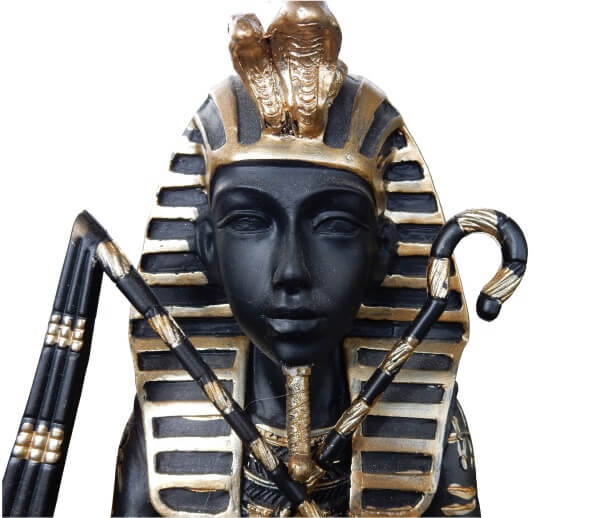(לא) וַיֹּ֨אמֶר יוֹסֵ֤ף אֶל־אֶחָיו֙ וְאֶל־בֵּ֣ית אָבִ֔יו אֶעֱלֶ֖ה וְאַגִּ֣ידָה לְפַרְעֹ֑ה וְאֹֽמְרָ֣ה אֵלָ֔יו אַחַ֧י וּבֵית־אָבִ֛י אֲשֶׁ֥ר בְּאֶֽרֶץ־כְּנַ֖עַן בָּ֥אוּ אֵלָֽי׃ (לב) וְהָאֲנָשִׁים֙ רֹ֣עֵי צֹ֔אן כִּֽי־אַנְשֵׁ֥י מִקְנֶ֖ה הָי֑וּ וְצֹאנָ֧ם וּבְקָרָ֛ם וְכׇל־אֲשֶׁ֥ר לָהֶ֖ם הֵבִֽיאוּ׃ (לג) וְהָיָ֕ה כִּֽי־יִקְרָ֥א לָכֶ֖ם פַּרְעֹ֑ה וְאָמַ֖ר מַה־מַּעֲשֵׂיכֶֽם׃ (לד) וַאֲמַרְתֶּ֗ם אַנְשֵׁ֨י מִקְנֶ֜ה הָי֤וּ עֲבָדֶ֙יךָ֙ מִנְּעוּרֵ֣ינוּ וְעַד־עַ֔תָּה גַּם־אֲנַ֖חְנוּ גַּם־אֲבֹתֵ֑ינוּ בַּעֲב֗וּר תֵּשְׁבוּ֙ בְּאֶ֣רֶץ גֹּ֔שֶׁן כִּֽי־תוֹעֲבַ֥ת מִצְרַ֖יִם כׇּל־רֹ֥עֵה צֹֽאן׃
(31) Then Joseph said to his brothers and to his father’s household, “I will go up and tell the news to Pharaoh, and say to him, ‘My brothers and my father’s household, who were in the land of Canaan, have come to me. (32) The men are shepherds; they have always been breeders of livestock, and they have brought with them their flocks and herds and all that is theirs.’ (33) So when Pharaoh summons you and asks, ‘What is your occupation?’ (34) you shall answer, ‘Your servants have been breeders of livestock from the start until now, both we and our fathers’—so that you may stay in the region of Goshen. For all shepherds are taboo to Egyptians.”
(כב) וַיֹּ֣אמֶר מֹשֶׁ֗ה לֹ֤א נָכוֹן֙ לַעֲשׂ֣וֹת כֵּ֔ן כִּ֚י תּוֹעֲבַ֣ת מִצְרַ֔יִם נִזְבַּ֖ח לַיהֹוָ֣ה אֱלֹהֵ֑ינוּ הֵ֣ן נִזְבַּ֞ח אֶת־תּוֹעֲבַ֥ת מִצְרַ֛יִם לְעֵינֵיהֶ֖ם וְלֹ֥א יִסְקְלֻֽנוּ׃
(22) But Moses replied, “It would not be right to do this, for what we sacrifice to the Eternal our God is taboo to the Egyptians. If we sacrifice that which is taboo to the Egyptians before their very eyes, will they not stone us!
-The New Bible Commentary, G J Wenham

Amun was a very important god in Ancient Egypt, and in the New Kingdom (1550-1070 B.C.E.) he was seen as the king of the gods, and was syncretized with the sun god as Amun-Ra. It would doubtless have been offensive to the priests of Amun to sacrifice a ram, and there certainly were temples of Amun in the Delta in the vicinity of Goshen and the capital, Pi-Ramesse. That such an act would be offensive would have been clear to any educated person who knew about Egypt in ancient times. Herodotus, in his survey of Egyptian customs, writes (Histories, 2:42):
Now all who have a temple set up to the Theban Zeus (=Amun) or who are of the district of Thebes, these, I say, all sacrifice goats and abstain from sheep… the Egyptians make the image of Zeus (=Amun) into the face of a ram… the Thebans then do not sacrifice rams but hold them sacred for this reason.
...The worship of sacred animals is as old as Egyptian religion. Each of the major and many of the minor deities had their specific sacred animals. Although veneration of these animals was part and parcel of the cult from olden times, it assumed a new significance under foreign, i.e., Persian domination when the cult of the sacred animals became a matter of cultural-religious identity, not unlike cow worship in India under British colonial rule.
The mention of the תועבה or “abomination” (i.e., taboo in the sense of the most sacred, untouchable item) of the Egyptians seems to reflect this stage in the Persian
era when the sacred animals achieved the highest status of sanctity in Egypt. In turn, this taboo would have been well-known in the Persian age, both to Greek writers like Herodotus and to the Jewish scribes in Jerusalem, who gave us the final form of the exodus story.



This is a powerful understanding of what otherwise appears to be a simple moment in the narrative. Rachel is not just a shepherd and her flock is not just sheep; she is a leader of our nation whose influence brings us out of exile. Rachel models a form of leadership predicated on unconditional love and unwavering commitment. A shepherd’s primary job is to protect their flock from predators and bring all of their sheep home at the end of the day. Shemot Rabbah 2:2 states that Hashem chose to reveal Himself to Moshe at the mareh ha’sneh, the vision of the Burning Bush, when Moshe ran after an errant kid, displaying his sense of responsibility to even the smallest goat in his care. So too did Rachel take her mandate as shepherd seriously, refusing to rest until Hashem promised her that her flock would find its way home.
by Rabbi Shai Held 2014
So the Torah tells us something else about Moses: he was a shepherd (Ex 3:1). To perform his duties properly, a shepherd must combine power on the one hand, with gentle attentiveness on the other. He must have the capacity to control and provide for his sheep, but he must also nurture and care for each one.
(1) A psalm of David. The Eternal is my shepherd; I lack nothing.



